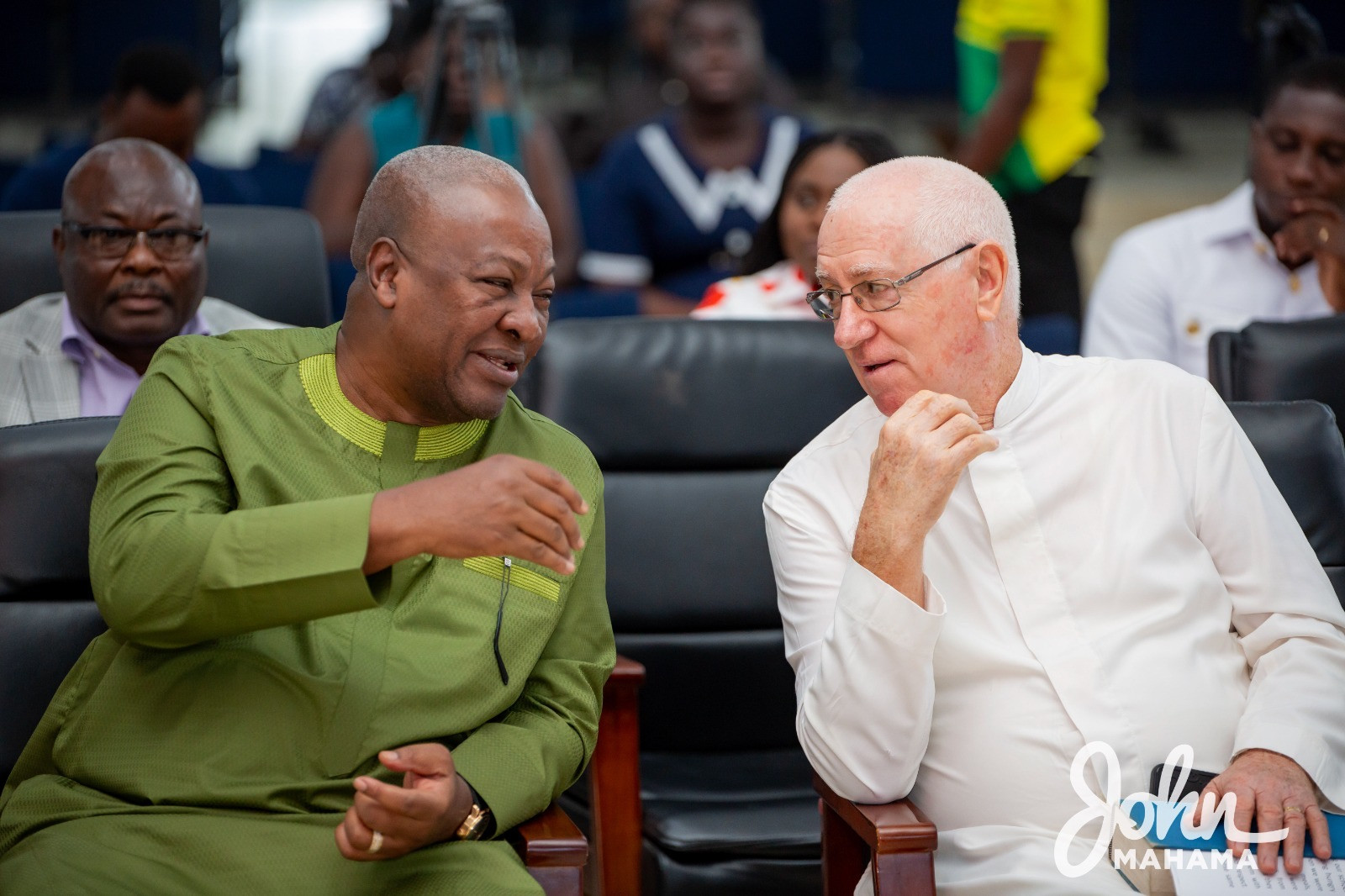


2023-10-05
I am honoured to join you to celebrate the United Nations International Day for Older Persons and the inaugural Aging Conference.
Let me start by sharing a short personal story. I have a good friend, a Professor at the University of Ghana. Although we regularly stayed in touch over the phone, I had not seen him in a while. When I finally did, I found my friend holding a walking stick to support himself. Unfortunately, this story is not uncommon with older persons as we age.
As we age, it is common to experience various physical ailments such as waist pains, knee aches, back and neck discomfort, and general bodily weakness. Some individuals even require wheelchairs and Zimmer frame walkers to assist with their mobility. I have many elderly friends I visit and attend to occasionally, and these challenges, which impact the quality of their lives, are all too familiar and similar. However, it is also important to acknowledge that some older adults are living their best lives after retirement without much to worry about.
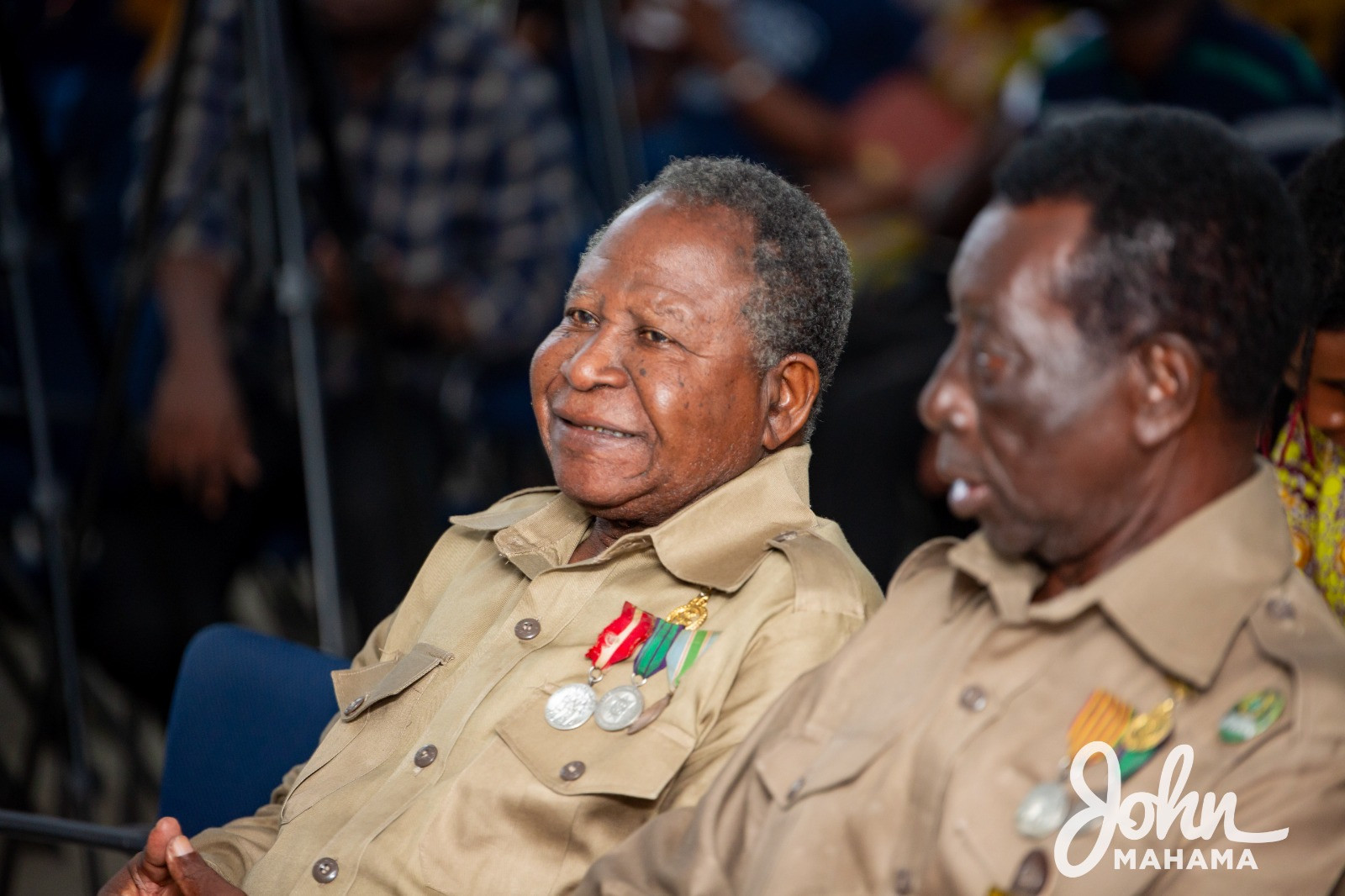
These individuals are fortunate enough to be in good health. They enjoy a comfortable lifestyle. I pray one day; I can count myself as one of those without many aches and pains.
Another beauty about visiting the elderly is when you find them surrounded by their families and grandchildren – even for short family visits – with grandpa or grandma imparting wisdom and guidance.
Contrary to being a vulnerable group, the elderly have a wealth of knowledge and experience they share, and if given the opportunity, they can contribute significantly to our society's progress.
Sadly, many older persons cannot access the necessary support systems and environments to help them be more comfortable during their retirement from active service. This is a matter of concern and impairs the ability of the elderly to contribute to society. This is why I am excited the elderly are the primary focus at this gathering.
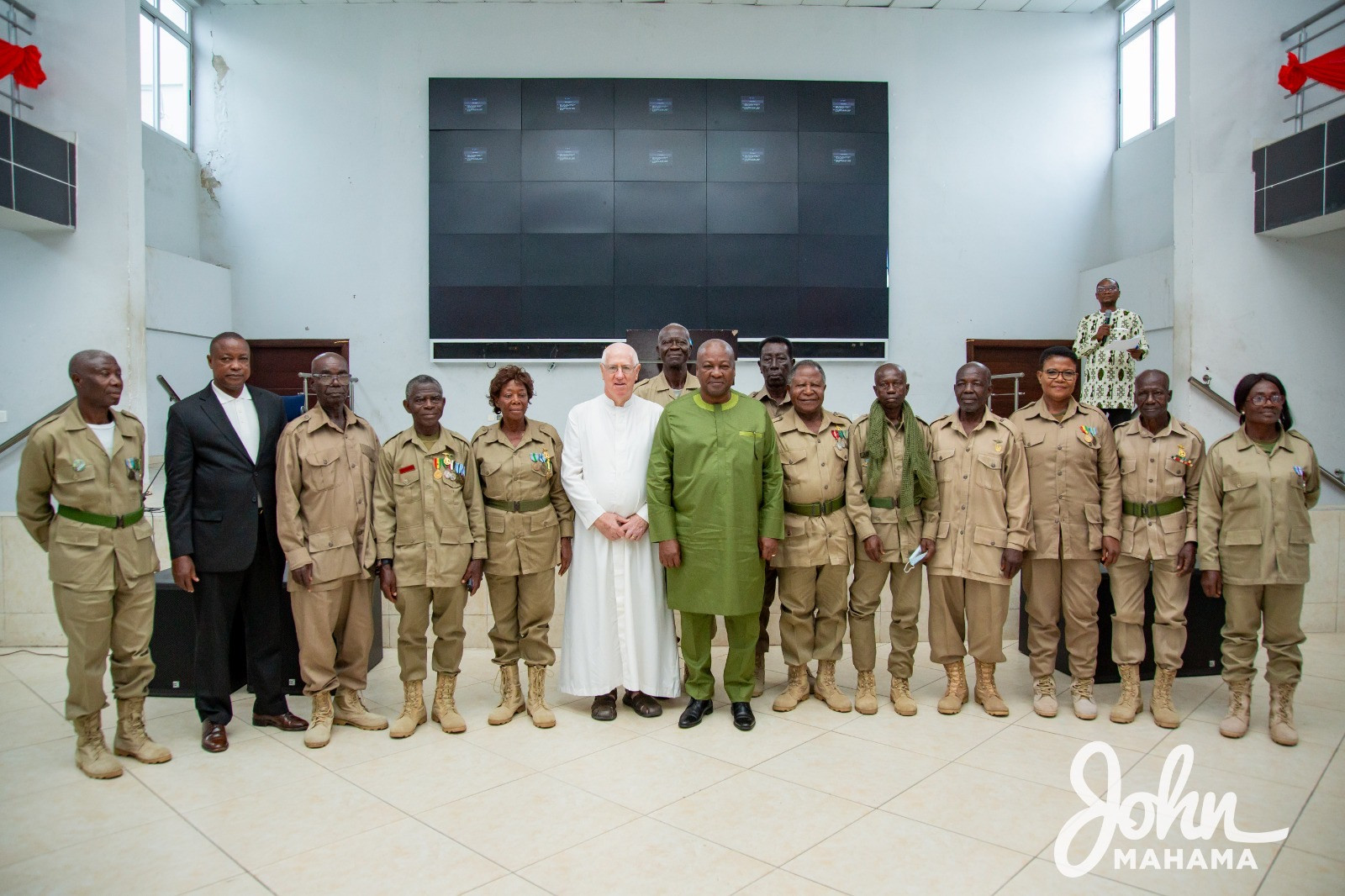
It is important to talk about the aged, especially when our country faces economic and leadership problems. Yes, we must focus on the youth— providing education, skills training, mentorship, and employment opportunities. But we must not overlook the plight of the elderly who have served our society and deserve their earned rest in retirement. That is why we need to raise awareness of the conditions of our parents and grandparents and commemorate the UN International Day of Older Persons.
We should support the Universal Declaration of Human Rights regarding older persons. Discussing quality ageing is a conversation everyone needs to participate in – even the younger generation. Let me explain why.
According to the United Nations, a person is considered elderly if they are 60 years or older, while medical research sets the age at 65 or above. In Ghana, the retirement age is set at 60 years. As of 2020, only 5.6% of Africa's population was aged 60 or older, making it the smallest proportion worldwide. This contrasts with North America, where 23.4% of the population is 60 or older. Other regions also have double-digit percentages.
The 2021 National Population and Housing Census found that in Ghana, 4.3% of the population is 65 years or older. The 60-year marker would likely add another one per cent to the figure. In addition, the number of older Africans and Ghanaians is projected to triple from 74.4 million to 235 million between 2020 and 2050. Even more striking is that, by 2050, there will be more older people than children under 15 in Africa for the first time.
This is evidenced by the population statistics. The last population census showed a slowdown in our birth rate and a reduction in the fertility rate. This means today's young people will become the old people in 2050. This shift is due to the younger, active working population ageing into this bracket. As a result, we must prepare for the future of the young even as we take care of the old people of today.
Allow me, therefore, to congratulate the Los Abuelos Foundation for the timely organisation of the 1st Ghana Ageing Conference. My presence here is a firm endorsement of the Conference as a biennial convergence of relevant stakeholders to dialogue on issues that affect and promote quality ageing in Ghana.
I also agree with the Los Abuelos Foundation that we have many issues affecting healthy ageing in Ghana. These include a lack of subsidised healthcare and transport, near absence of both geriatric centres for specialised care and aged-friendly environments in our communities, abuse of the rights of the elderly, and low pension allowances and income. And let me add the recent cruel stab by the government in the retirement income securities of the elderly due to the Domestic Debt Exchange Programme (DDEP).
Indeed, ageing should be everybody’s concern and our priority and business. We must ensure the aged receive their returns on investments – they must have no cause to worry about their social security pensions. To help improve the economic well-being of older people, we must guarantee them financial inclusion by facilitating easy access to microfinance services. It will enable them to save, invest, and access funds for their basic needs and emergencies.
Ladies and Gentlemen, ahead of the 2020 elections, I laid out several policy proposals aimed at improving the general well-being of Ghanaians. The policies were well thought-through and tailored specifically toward our elderly citizens. We committed to establishing a Centre of Excellence for training social workers to care for the elderly and reactivating the Eban Elderly Welfare Card to enable Ghanaians above sixty (60) years to have priority access to social services.
We further promised to amend the National Health Insurance Act to exempt all persons aged sixty (60) and above from paying the NHIS premium. This will remove the inequity where those above 60 and on SSNIT pensions do not pay premiums, but their counterparts from the informal sector pay premiums.
We were also determined to establish Day Centres where the elderly could visit, play games, and interact with their peers. We remain committed to these promises and shall revisit them appropriately. Relatedly, by creating more community-based social support networks, such as senior citizen associations or clubs, our elderly will connect, share experiences, and find emotional support.
It is also my proposal that the Ministry of Tourism consider the promotion of a Senior Citizens Tourism Programme, which will enable our older persons to visit interesting domestic tourism sites they did not have the opportunity to visit during their working lives.
We must also restore the previously prominent Senior Citizens Day, celebrated on July 1st, our Republic Day. We must celebrate our senior citizens and use the opportunity to take stock of the quality care we provide the elderly. As President, I tried to do my best to help alleviate the suffering of selected groups of seniors. I provided an amount of one million Ghana Cedis to MUSIGHA as seed money for their aged musician fund.
Ladies and gentlemen, affordable and quality healthcare becomes critical as we age. Integrating well-functioning geriatric care within Ghana’s health system is essential. We must also increase the number of healthcare professionals specialising in geriatrics.
In this regard, one of my significant proposals is to introduce an Elderly Long-Term Care programme (ELTC). The experts refer to Elderly Long-Term Care as a range of non-medical and medical services for individuals who, among others, have reduced physical capacity to care for themselves over extended periods. This would aim at enabling elderly Ghanaians in this state to achieve and maintain optimal levels of personal functioning and dignity. These will include assisted mobility, safe feeding, shopping, etc.
Ladies and gentlemen, this is one of the reasons driving our quest to establish a Centre of Excellence for training social workers to care for the elderly. The programme will generate jobs for our young people. This is already the case in many advanced countries where young people are trained to provide home-based care for the elderly. If given the opportunity, I propose to include in our community health nursing programme a component for training nurses to provide health extension visits and services to the elderly in society.
I envision a day when community nurses would visit our older persons at home to monitor their blood pressure levels, measure their blood glucose levels, and offer health extension advice for better care to elderly persons and their families. Our society is experiencing increasing life expectancy and a high prevalence of non-communicable diseases.
I want to revisit our 2020 manifesto, in which I promised to declare “renal (kidney) failure, diabetes, and hypertension a national health emergency and provide better access to affordable treatment for persons suffering from these illnesses.” I also promised to establish a Cancer and Kidney Disease Trust Fund to support victims suffering from these very expensive diseases. This fund will support Ghanaians who need assistance with the care of kidney diseases and cancers.
These promises can be found on page 63 of the NDC’s manifesto of 2020. Given the opportunity, we shall relieve thousands of our citizens suffering from these illnesses.
Just this week, there was an uproar when the nation’s premier teaching hospital, Korle bu, announced an increase in charges for dialysis treatment by one hundred per cent. This threatened to put the cost of dialysis treatment out of reach for many patients and their families. The explanations I have read from the Korle bu Teaching Hospital cite the increase in taxes and duties of materials for dialysis treatment as the main reason for this decision.
As an immediate measure, I call on the government to exempt medication and kits for dialysis treatment from taxes and duties to maintain this critical lifeline for patients whose survival depends on this.
I have first-hand experience with the story of an Assembly member from the Bole-Bamboi District, where I was a Member of Parliament for twelve years. This Assemblyman had to travel weekly to Kumasi for dialysis treatment because there was no such facility near the district. After a while, transportation to and fro became too expensive. He had to move with his wife, his caregiver, to Kumasi, near the health facility, for ease of treatment.
The cost of treatment and care drained the family financially. Despite the monetary support I continued to give the family, the absence of an opportunity for a transplant led to a deterioration in his condition and his eventual death. These are real-life stories and not statistics.
Amid the current economic crisis and a difficult period for many Ghanaians, with worsening hardship, high cost of living, collapsing businesses and unemployment, the government should not be insensitive by passing on catastrophic healthcare costs to people with life-threatening diseases. This is akin to condemning kidney disease patients to a death sentence. Many of such patients are in the bracket of the elderly.
Another issue of great concern to me is our emergency or critical care system relating to Intensive Care Units and High-Dependency Units in hospitals. While in office, we replaced many of the obsolete health equipment in Ghana’s hospitals. We also constructed ultra-modern hospitals such as the Ridge Hospital, the University of Ghana Medical Centre, the Bank Hospital, the Maritime Hospital, and the Dodowa and Ga East hospitals.
Credible information suggests Ghana’s premier hospital, the Korle Bu Teaching Hospital, is struggling with inadequate ventilators. While promising to fix the health care system as we have envisaged, I am appealing to the government to immediately attend to the needs of Korle Bu and other hospitals in need. This critical intervention will limit the avoidable deaths that their present state of deprivation may occasion.
Our population is ageing, and better health care becomes a high priority with ageing. This is why we are committed to providing our beloved country, Ghana, with a compassionate leadership that meets our citizens' aspirations. We will not only work to bring our economy back on track. We will provide accountable leadership that ensures our communities are developed with the needed social and economic infrastructure to bring relief to Ghanaians.
At the 1st Ghana Ageing Conference, I stand before you today to renew my commitment to these promises, including providing better access to affordable health care to the aged.
Ladies and gentlemen, we can meet the goals of the Universal Declaration of Human Rights for Older Persons, the SDGs, and the African Union Agenda 2063. As a key step, we must reinforce the legal framework that protects the interests and rights of the aged by facilitating the passage of the Social Protection Bill and Aged Persons Bill. I am fully committed to this noble objective, and as President, I will lead the advocacy for an effective implementation.
It is not enough to raise awareness about the need for health care and social provisions for the elderly. Let us assist them with access to new technology and help the elderly use these technologies to improve their quality of life. Let us make the effort to spend quality time with the elderly in our families and communities. We can attend church or community activities, frequently call, and speak with them, or spend time with them at home. This way, we can help them and gain insights into what it means to grow old.
Remember that we will all grow old one day, and any investment we make in caring for the elderly is an investment in ourselves.
Thank you, and my appreciation to the Foundation for the opportunity to join you and celebrate the UN International Day of Older Persons with you.
Thank you for your attention.
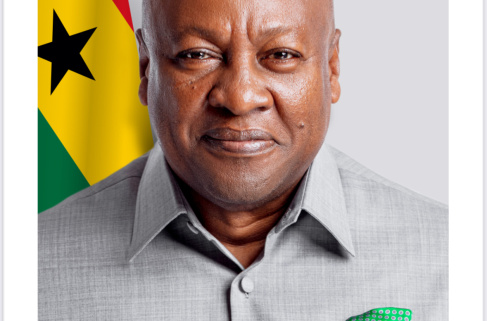
Presidency Communications has released the official portrait of President John Dramani Mahama, which is available for download below. The portrait... [read more]
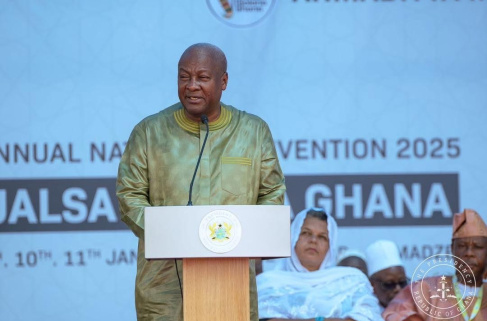
Pomadze, Ghana - President John Dramani Mahama has reaffirmed his commitment to reforming and strengthening the country’s justice system. Speaking... [read more]
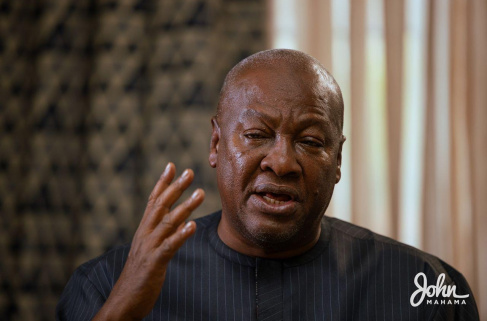
Fellow citizens, my brothers and sisters. As we begin the new year 2025, Lordina and I wish each of you... [read more]